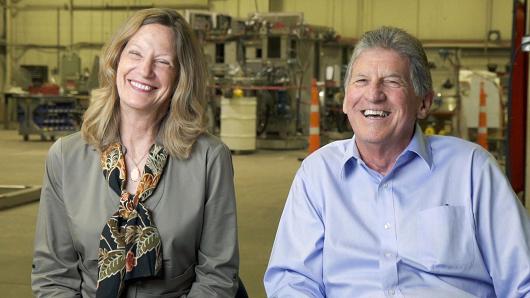Companies in the business services sector, including management consulting and legal services, continue to grow, reflecting trends in the broader economy. No surprise there. But new data shows mid-size manufacturers — long considered past their prime to overseas pressures — are still going strong in the U.S. economy.
And more often than not, American manufacturers are shying away from cookie-cutter goods and services, and instead finding niche markets and opportunities to export high-end innovation to China.

Denise and Dale "Mac" McIntosh of Custom Powder Systems, based in Springfield, Missouri.(Source: Dun & Bradstreet)
"You find your niche and run away from the commodity business," said Dale "Mac" McIntosh, owner of Custom Powder Systems, a Springfield, Missouri based company that designs, manufactures, integrates and tests all material handling, containment and cleaning systems.
In the fast paced industry of stainless steel fabrication, Custom Powder Systems met challenges head-on by advancing technology; utilizing Inventor 3D modeling and leveraging Autodesk Vault to quickly find managed drawing files. D3 Technologies and Custom Powder Systems worked closely to understand current processes to identify areas of continuous improvement. The valued partnership built a consultative trust between CPS and D3 resulting in further streamlining of Standard Operation Procedures with Automation tools tailored to the needs and current requirements with a justifiable ROI.
With their expert design engineers, plus Autodesk training and CAD support from D3 Technologies’ technical and implementation teams, they are able to create 100% customized containers and workflows that eventually result in final products, including Pepperidge Farm crackers and tiny Advils.
With their expert design engineers, plus training and support from D3 Technologies’ CAD support and implementation teams, they are able to create 100% customized containers and workflows that eventually result in final products, including Pepperidge Farm crackers and tiny Advils.
"We are the precursor to all packages," said McIntosh, who's been running Custom Powder Systems for 10 years and counting. "We're a leader in a small, niche industry." Their client roster of Fortune 500 companies straddle biotech, pharmaceuticals and the food business.
Business, of course, has improved since the depths of the financial crisis. McIntosh decided to bypass layoffs at the time, but that decision came at a price. "That cost us $1 million in 2009," he said. "It was difficult."
Years later, with a broader economic recovery, the rate of growth in business services is outpacing traditional sectors, but manufacturing and wholesale trade continue to be key industries among U.S. companies with revenues between $10 million and $1 billion annually. The companies studied were larger than mom-and-pops but not yet full-fledged multinationals, and are sometimes referred to as middle-market companies.
"Manufacturing is still one of the top sectors," said Julie Weeks, research advisor at American Express. She authored the middle market report. "Manufacturing is still important."
More than half of the middle-market companies, detailed in the report, straddled four sectors: manufacturing at 17 percent, wholesale trade at 13 percent, retail trade at 12 percent and business services at 12 percent. Business services included companies ranging from advertising agencies to architecture firms.
The report also found more younger middle market companies in business services fields, including interior design and public relations. The data shows which industries millennial entrepreneurs are choosing.
"While manufacturing continues to be a critical piece of our economy, we are moving to a technologically advanced service economy and these younger middle market firms are both driving growth and, importantly, creating significant numbers of new jobs," said Jeff Stibel, vice chairman of Dun & Bradstreet, in prepared remarks.
Back in Missouri, Custom Powder Systems is busy growing and shipping a large container system to China. "They don't have the resources to do it there," business owner McIntosh said.
Earlier this year, global stock markets were hit by data showing slower growth in China, the world's second-largest economy. While China's growth engine certainly is weaker, the investment case for China — and its nearly 1.4 billion people, driving sales and profits for companies — remains intact.
"It's easy to connect the dots and say, 'This is a collapse in the overall Chinese economy and consumption,' " China expert Jeff Walters said last month. "It's not," added Walters, a Hong Kong-based partner at the Boston Consulting Group.
And again, specializing can fuel business longevity, despite overseas pressures. "Don't be a commodity business," said McIntosh. "It's impossible to compete with the Chinas and Indias" in that regard.
As conversations evolve today, there are additional thoughts being brought to the table inside and outside of Engineering. CPS continues to ask the question about what else can be done to streamline areas not being handled by their ERP already. They are exploring how Integrated Dashboard Solutions can further bridge those gaps that will allow them to successfully compete in this global market where they have found their fit.
If your company would like to participate in a D3 Customer Spotlight, or if you would like to learn more, please contact D3.